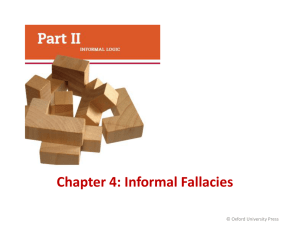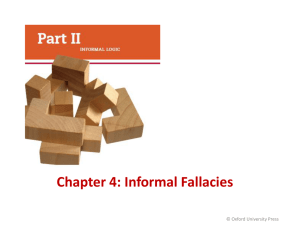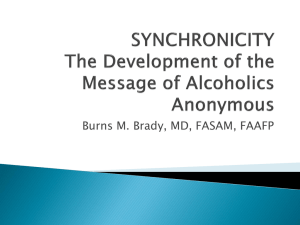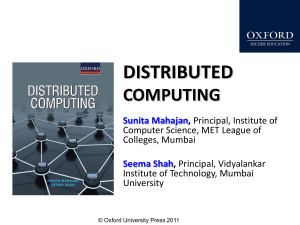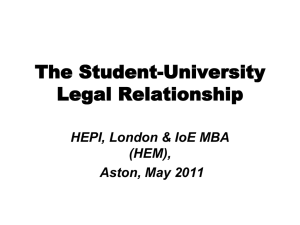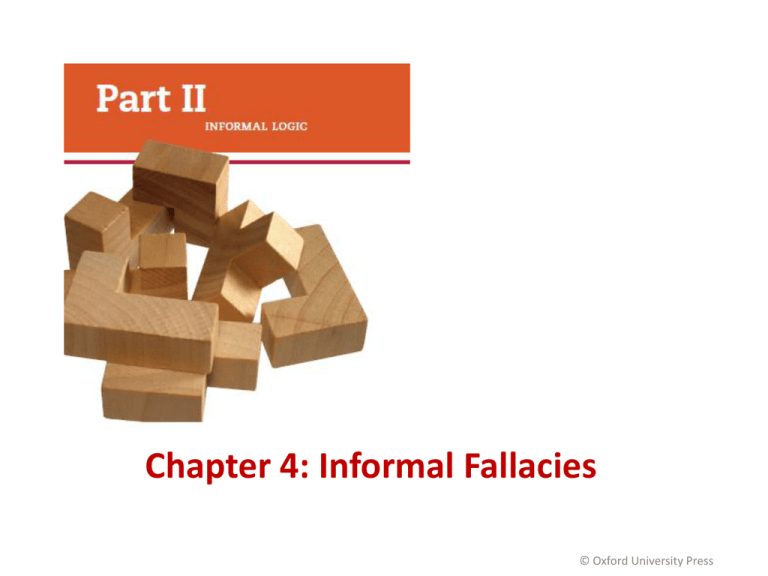
Chapter 4: Informal Fallacies
© Oxford University Press
In This Chapter
A.
B.
C.
D.
Fallacies of Relevance
Fallacies of Unwarranted Assumption
Fallacies of Ambiguity or Diversion
Recognizing Fallacies in Ordinary Language
© Oxford University Press
Fallacies of Unwarranted Assumption
Arguments that
assume the truth of
some unproved or
questionable claim.
9.
10.
11.
12.
13.
14.
15.
16.
Begging the Question
Complex Question
Biased Sample
Accident
Hasty Generalization
Misleading Precision
False Dichotomy
False Dilemma
False Cause Fallacies:
17. Coincidence
18. Post Hoc Fallacy
19. Common Cause Fallacy
20. Slippery Slope
© Oxford University Press
Begging the Question
Petitio Principii — “assumption at the beginning”
Assumes as evidence in the premises the very thing
that it attempts to prove in the conclusion.
Jane has the highest GPA among
all the seniors in my school.
There are three hundred
graduating seniors in my class.
Therefore, no senior has a higher
GPA than her.
Premise and the
conclusion say the
same thing; premise
becomes irrelevant.
See also “circular reasoning”
© Oxford University Press
The first and most common example is to leave out a possibly false premise:
Murder is morally wrong. This being the case, abortion is morally wrong.
Of course humans and apes evolved from common ancestors. Just look at how
similar they are.
Clearly, terminally ill patients have a right to doctor-assisted suicide. After all,
many of these people are unable to commit suicide by themselves.
The world in which we live displays an amazing degree of organization.
Obviously this world was created by an intelligent God.
What are the missing premises?
© Oxford University Press
Second form: the argument restates a possibly false premise in slightly
different language.
Capital punishment is justified for the crimes of murder and kidnapping
because it is quite legitimate and appropriate that someone be put to death
for having committed such hateful and inhuman acts.
Anyone who preaches revolution has a vision of the future for the simple
reason that if a person has no vision of the future he could not possibly preach
revolution.
Third form: circular reasoning
Ford Motor Company clearly produces the finest cars in the US. We know they
produce the finest cars because they have the best design engineers. This is
true because they can afford to pay them more than other manufacturers.
Obviously they can afford to pay them more because they produce the finest
cars in the United States.
© Oxford University Press
Consider:
No dogs are cats.
Therefore, no cats are dogs.
London is in England and Paris is in France.
Therefore, Paris is in France and London is in England.
These arguments are sound: they are valid and have true premises. No fallacy
is committed because there is no illusion created to make inadequate
premises appear as adequate. Thus, this argument:
My brother suffers from insomnia. Therefore, my brother has difficulty
sleeping.
commits no fallacy. Notice that arguments that beg the question are normally
valid.
© Oxford University Press
Complex Question
A single question that actually contains multiple, hidden
parts.
Do you still cheat on your taxes?
Answering “yes” or “no” presumes you do or did cheat on your taxes.
I asked you if you still cheated on
your taxes. You said "No."
Therefore, by your own
admission you did cheat on your
taxes.
The premises rely on two
distinct questions:
A. Did you ever cheat on
your taxes?
B. Do you now cheat on
your taxes?
© Oxford University Press
Biased Sample
Uses a nonrepresentative sample as support for a
statistical claim about an entire population.
Evidence shows that
approximately 85% of all
Americans believe that abortion
is morally wrong. Recently, a
sample of Catholics revealed
that 85% believe that abortion
is morally wrong.
The sample surveyed
only Catholics, but
the conclusion
generalizes to all
Americans.
© Oxford University Press
Accident
Rigid Application of a Generalization
When a generalization is inappropriately applied to the
case at hand.
I can’t believe that the police
didn’t give the driver of that
ambulance any citations. The
driver was speeding. The
driver went through a red
light. The ambulance swerved
from lane to lane without
using any turn signals.
While nonemergency
vehicles are subject to
penalties, exceptions
apply to ambulances
when responding to
emergencies.
© Oxford University Press
Examples:
Freedom of speech is a constitutionally guaranteed right. Therefore, John Q.
Radical should not be arrested for his speech that incited the riot last night.
Property should be returned to its rightful owner. That drunken sailor who is
starting a fight with his opponents at the pool table lent you his .45-caliber
pistol, and now he wants it back. Therefore, you should return it to him now.
The First Amendment to the Constitution prevents the government from
interfering with the free exercise of religion. The liturgical practice of the
Religion of the Internal Enlightenment involves human sacrifice. Therefore, it
would be wrong for the government to interfere with this religious practice.
© Oxford University Press
Hasty Generalization
Converse Accident
A generalization created on the basis of a few instances.
I saw a fraternity guy act rudely
to a fast food employee in the
food court at lunch today.
Probably most fraternity and
sorority members are rude and
arrogant.
The premise reports a
single instance, while
the conclusion
generalizes the behavior
to most fraternity and
sorority members.
© Oxford University Press
Examples:
After only one year the alternator when out in Mr. O’Grady’s new Chevrolet.
Mrs. Dodson’s Buick developed a transmission problem after six months. The
obvious conclusion is that cars made by General Motors are just a pile of junk
these days.
Ten Arab fundamentalists hijacked planes and crashed them into the World
Trade Center in New York City. The message is clear: Arabs are nothing but a
pack of religious fanatics prone to violence.
Note: a small sample does not necessarily mean that it’s atypical:
Ten milligrams of substance Z was fed to four mice, and within two minutes,
all four went into shock and died. Probably, substance Z is fatal to mice.
On three separate occasions, I drank a bottle of Figowitz beer and found it flat
and bitter. I would probably find every bottle of Figowitz flat and bitter.
© Oxford University Press
Misleading Precision
A claim that appears to be statistically significant, but
is not.
Our cookies contain 30%
less fat, so you should
start eating them if you
want to lose weight.
It is fair to ask, “30% less
fat than what?” We need
to know before we can
judge the significance of
this claim.
© Oxford University Press
False Dichotomy
A fallacy that occurs when it is assumed that only two
choices are possible, when in fact others exist.
Either you agree with me or you are an idiot.
Two reconstructions ignore additional choices:
Either you agree with me or you
are an idiot.
You are not an idiot.
You agree with me.
Either you agree with me or you
are an idiot.
You do not agree with me.
You are an idiot.
Either you agree with me or you are an idiot or your position is correct.
You do not agree with me.
You are not an idiot.
Your position is correct.
© Oxford University Press
Examples:
Either you let me attend the Miley Cyrus concert or I’ll be miserable for the
rest of my life. You don’t want me to be miserable, so you gotta let me go to
that concert!
Either you use Ultra Guard deodorant or you risk the chance of perspiration
odor. You don’t want to stink. Therefore, you must use Ultra Guard.
If the alternatives are exhaustive, then no fallacy is committed:
Either Reno is in Nevada or it is not in Nevada.
Or if one of the alternatives of the disjunction is true:
Either Seattle is in Washington, or it is in Oregon.
Seattle is not in Oregon.
Therefore, Seattle is in Washington.
© Oxford University Press
False Dilemma
dilemma – “double proposition”
Occurs when two choices are asserted, each leading to an
unwanted result, with failure to acknowledge that other
possibilities exist.
Either we give up some traditional basic freedoms, or we lose
the war on terror.
G = we give up some traditional basic freedoms
L = we lose the war on terror
G or L
Not L
G
What are other possible choices? Can we win the war on
terror without giving up some traditional basic freedoms?
© Oxford University Press
False Cause Fallacies
Occur when a causal connection is assumed to exist
between two events when none actually exists.
17. Coincidence
18. Post Hoc Fallacy
19. Common Cause Fallacy
20. Slippery Slope
© Oxford University Press
Coincidence
Results from the accidental or chance connection
between two events.
I can prove that some dreams let
us see into the future. Last week, I
dreamed that my cousin Charlie
was in a terrible car wreck. Just
now, I got a phone call from my
cousin Charlie's wife saying that he
is in the hospital because he was in
a car accident.
We have thousands of
dreams a year; a few
are likely to resemble
real events. We forget
that most dreams do
not connect to real
events.
© Oxford University Press
Post Hoc Fallacy
post hoc, ergo propter hoc – “after the fact, therefore because of the fact.”
Involves a short-term pattern noticed after the fact.
Researchers have found a pattern
showing that while a Democrat was
president, Morphiacola topped all
soft-drink sales. While a Republican
was president, Opiacola topped all
sales. You should invest in the softdrink company based on who is in the
White House.
This post hoc argument
falls prey to the mistake
of confusing a correlation
with a cause.
© Oxford University Press
Examples of post hoc:
During the past two months, every time the cheerleaders have worn blue
ribbons in their hair, the basketball team has been defeated. Therefore, to
prevent defeats in the future, the cheerleaders should get rid of those blue
ribbons.
A few minutes after President Obama finished his speech on television, a
devastating earthquake hit California. For the safety of the people out there, it
is imperative the President Obama make no more speeches.
© Oxford University Press
Common Cause Fallacy
Occurs when one event is assumed to cause another
when both events are the result of a common cause.
A falling barometer is
the cause of a storm.
In fact, both events are
caused by a change in
atmospheric pressure.
© Oxford University Press
Slippery Slope
Attempts to make a final event the inevitable outcome
of an initial act.
If you start smoking marijuana for pleasure, you
will need more and more to achieve the expected
high. You will begin to rely on it whenever you feel
depressed. Eventually you will experiment with
more powerful drugs. The amount of drug intake
will have to increase to achieve the desired
results. At this point, the addiction will take hold
and will lead to a loss of ambition, a loss of selfesteem, the destruction of your health, and the
dissolution of all social ties. Therefore, you should
not start smoking marijuana.
Relies on a causal
network with each
step in the chain
causing next step.
The alleged
inevitability of the
final act needs is not
supported by
objective evidence.
© Oxford University Press
Slippery slopes can cut both directions:
Immediate steps should be taken to outlaw pornography once and for all. The
continued manufacture and sale of pornographic material will almost
certainly lead to an increase in sex crimes such as rape and incest. This in turn
will gradually erode the moral fabric of society and result in an increase of
crimes of all sorts. Eventually a complete disintegration of law and order will
occur, leading in the end to the total collapse of civilization.
And:
Attempts to outlaw pornography threaten basic civil liberties and should be
summarily abandoned. If pornography is outlawed, censorship of newspapers
and news sources is only a short step away. After that there will be censorship
of textbooks, political speeches, and the content of lectures by university
professors. Complete mind control by the central government is the inevitable
result.
© Oxford University Press
Check Your Understanding 4B
• Example I
A single question that actually contains multiple, hidden
parts is an example of Begging the Question.
– Answer
False
• Example II
Every time Mychal heard that song on the radio he sold more
memberships to the club than usual and increased his
commission! I think he should listen to that song each day
before work.
– Answer
Post Hoc fallacy
© Oxford University Press


